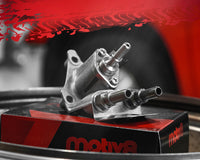What is a CCV system? In your BMW, combustion gases from the rapid burning of gasoline force the piston down into the cylinder. The piston and cylinder are an extremely close fit, but there is still a tiny amount of gas leakage from the cylinder; these gases flow into the engine's crankcase. These gases accumulate inside the crankcase and the internal pressure rises. When the pressure increases to a high level, your engine will relieve that pressure by blowing gaskets, seals, or other less common damage.
Fortunately, the crankcase ventilation system (CCV) in your BMW is designed to eliminate crankcase pressure. This system bleeds exhaust gases into the intake manifold, where they are reintroduced into the cylinders for additional combustion. Also, the CCV removes oil vapor from the exhaust and recycles the collected oil condensate back into the vehicle.
Now we know what the CCV system does, let’s look at how the system can fail.
The CCV on your BMW consists of two major components: a valve that controls the flow of gases, and hoses that connect everything together. A failure within any of these parts can cause trouble with your BMW's engine functioning.
Like most engine problems, a failure of the crankcase ventilation system will manifest itself by presenting one or more signs. Here are some you should look for:
- Oil consumption – this is the most prevalent symptom of a failing CCV system. Malfunctions within the system can cause oil-saturated gases to be carried into the engine and passed along to the cylinders. The oil will burn away in the cylinders, and you will notice a steady decrease in your oil levels.
- Excessive smoking – blue or gray smoke is a classic sign of oil being mixed with gasoline inside the cylinders. This is further confirmation of a failure of the system to separate oil from the exhaust gases.
- Abnormal air movement sounds – if you hear sounds that are best described as wheezing, whistling, or honking, suspect a failure within your CCV.
- Oily spark plugs – the spark plugs on a vehicle experiencing CCV failure are often coated with a layer of engine oil. Routine maintenance can help discover this problem, so be sure your spark plugs are checked, cleaned, and replaced as recommended.
In BMWs, there are two specific problems with the CCV that have appeared on a more frequent basis than normally expected: water/oil clogs and cracked or torn hoses.
Water condensation can also be a problem for some BMW engines, particularly in cold weather conditions. The condensate forms inside the CCV valve and mixes with the oil droplets. This creates a dull yellow "gunk" that clogs the valve and prevents it from operating correctly.
As for the CCV hoses, it is common to find brittle hoses within the system; these hoses readily crack and break, and this creates several other problems such as those described above. All hoses are susceptible to brittleness. If you need a new CCV hose for your BMW, you can find it in our catalog: Motiv8 PCV Hoses.
Have a good ride!




